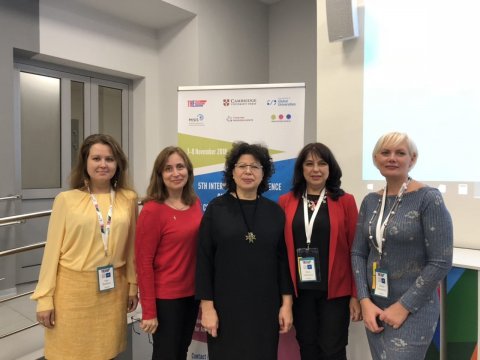The heads and members of the project team under М 8.1.3. “Implementing Advanced Language Training in the Bachelor’s Programme” 2.1.1 “Implementing the Best Practices of Language Training in Universities under Programme 5-100” took part in the 5th International Conference on ESP/EAP/EMI in the Context of Higher Education Internationalization.
The 5th anniversary conference was held on November 7-8, 2018 within the frameworks of the Times Higher Education Research Excellence Summit in cooperation with Cambridge University Press. The conference topic was on broadening the ideas of learning and teaching foreign languages, considering among other things the cognitive mechanisms involved in teaching foreign languages, as well as on developing communicative competences in the context of the changing technological environment.
The conference speakers and special guests included:
- Andrej A. Kibrik (Director of Institute of Linguistics RAS, Russia)
- Eun Gyong Kim (Professor for the School of Humanities and Social Sciences at Korea Advanced Institute of Science and Technology, South Korea)
- Magnus Gustafsson (Head of Language and Communication at Chalmers University of Technology, Sweden)
- Olga Capirci (Senior researcher at the CNR’s Institute of Cognitive Sciences and Technologies, Italy)
- Irene Clark (Director of Composition, and Director of the Master’s Option in Rhetoric and Composition at California State University, USA)
- Karen Ottewell (Director of Academic Development & Training for International Students, University of Cambridge, UK)
- Mark Ibbotson (ELT Author, Cambridge University Press, UK)
The presentations by SUSU mostly focused on analysing and summarising the experiences of implementing blended learning, which is actively introduced into the process of teaching at all stages of foreign language training (Bachelor’s, Master’s, and postgraduate studies), as well as into supplementary education. The main goal of such an approach is to improve the level of English language skills among students, who then can enjoy an opportunity to confirm their knowledge at an international level (IELTS exam) and gain a perspective of participating in international academic exchange programmes, doing science or performing professional activity in polylingual environment.




